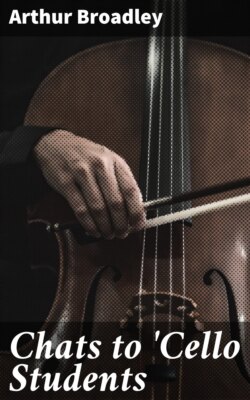Читать книгу Chats to 'Cello Students - Arthur Broadley - Страница 7
На сайте Литреса книга снята с продажи.
The Choice of an Instrument and Bow.
ОглавлениеTable of Contents
Do not let my reader imagine that in the present work I am going to weary him with a long discourse on a matter which is so much controlled by the length of the purse; I flatter myself, however, that the advice will at least be sound. To those who can afford to buy a real genuine Cremona of good name, I have nothing whatever to say; if they can afford this, they can, or ought for their own satisfaction and safety, to pay for professional advice as to the real merit of their purchase. It is to the readers with a limited amount of spare capital that I wish to address myself, and I would tell them that there are a lot of fairly old instruments either German or French copies of one or other of the early Italian School, that will be found quite good enough for solos. These instruments may have individual faults and weaknesses, but the player will gradually find these out and learn to humour them. Of the old English instruments I would advise the reader to beware, a lot of them although of good wood and passable varnish, yet manage to have some more or less irreparable fault not readily discernible at first sight. An instrument of this class I have in mind, a beautiful 'cello spoiled with the f holes being cut about half their length too low, making it impossible to play a forte passage on the A string owing to the bow coming in contact with the lower corners; so that this would not be readily noticed a fingerboard had been fitted, which was about three inches longer than is usual. Others are thin in the wood, causing wolf notes in various positions. These latter remarks refer more particularly to nameless old English instruments of the home-made type, and of course do not apply to the best work of such makers as Forster, Banks, Thompson, Joseph Hill, etc., many specimens of which have a particularly fine tone.
To the young player buying an instrument for life, if upwards of £15 can be given it is far better to purchase an entirely new one of good make, of a model suited to the individual taste of the student; by the time he has worked some ten or a dozen years on it he will have brought out most of the beauties of tone which the instrument is capable of giving. A really good new instrument improves more rapidly than is generally admitted—with good hard exercise work in all the positions.
In choosing a bow Dodd and Tourte are names to conjure with, but happily there are no lost "secrets" in the art of bow making, and fortunately a new bow after a few weeks use is better than an old one, therefore the craze for old bows except with collectors and rich amateurs, will never be so pronounced as is the case with old instruments. If the student can pay say a couple of sovereigns, he must consider himself tricked if he does not secure a bow good enough for any sort of work, and one which will with care last for years.
I have lately come across some French bows without any name, retailed, I believe, at about thirty shillings, which are very fine indeed, nice and light with plenty of spring. Some recommend a second-hand bow, saying that in buying one that has been used the faults, if any, will have made their appearance, but as it is hardly possible to tell whether a bow has been much used unless the stick is very badly worn, this is hardly sound. Buy from a conscientious dealer, pay a fair price and trust to it, that is all that can be done.
